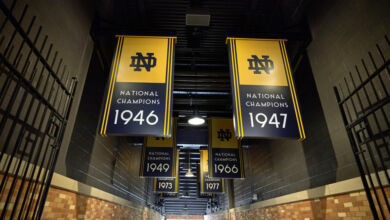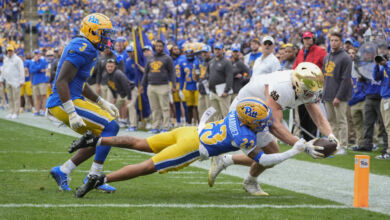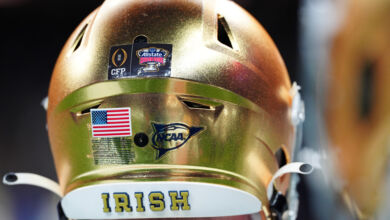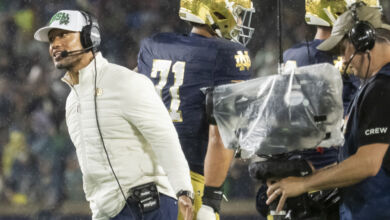When Golden Tate joined the Irish recruiting class of 2007, he did so late in the process and without a whole lot of fanfare. Tate was middle of the pack recruit in an Irish class which saw every member with the exception of Andrew Nuss, hold a higher national position ranking than Tate held at wide receiver (#37 according to Scout). In fact, Duval Kamara was the receiving recruit which had Irish fans giddy with potential and it was Harrison Smith which had Irish fans shocked we could take him away from the SEC (Smith and Tate hail from Tennessee).
But Tate has emerged as the biggest playmaker for an Irish team with loads of playmaking potential. Without a lot of recruiting hype and because of uncertainty on which position he would end up playing at Notre Dame (Tate was a running back in high school), Tate’s journey to the biggest threat for the Irish has been a surprisingly quick one.
Credit goes to both Tate and the Irish coaching staff who was able to develop his skills and an offense that got the ball into his hands. Don’t underestimate either. Recall Tate’s rookie season. He had one big game as a freshman (vs. Purdue, 3 catches, 104 yds, TD) and was essentially an afterthought the rest of the season. Tate was young, was in a new position and only knew how to do one thing. Run deep and make a spectacular catch. But the times were few and far between when last year’s offense had the time to allow that to happen. But the coaching staff learned something from Tate’s short lived playmaking ability, the need to get the ball into his hands.
The progress from freshman to sophomore year and an offseason of hard work is evident. It Tate isn’t already a complete player midway through his second season, he is on his way. A man who drew criticisms from head coach Charlie Weis as recent as the San Diego State game – Weis could be heard yelling at Tate on NBC saying, “That’s exactly what I’m talking about when you do not know how to run the right route!” – now runs crisp routes, has elite ball skills and the speed and strength to break a routine play into a long one.
But Tate’s maturity beyond his class does not end with his athletic ability. It is his intelligence as a student of the game and leadership potential that could pay off the most. For the second week in a row, Tate seems to be the only one acknowledging the elephant on the Irish football playing field. Following the win at Washington, Tate said of the Irish offense, “I feel like we could have scored more… I think we let up once we had them 14-0.” Following the loss to Pitt he said, “We’re up two scores at halftime. We weren’t playing the same we did in the first half. I feel like we left some plays on the field. We let up, and the next thing you know, it’s a tied ball game.”
Win or lose, the theme has been a similar one for Notre Dame this year.
After opening up a 21-point first half lead on Michigan, the Irish gave up ten consecutive points, did not score in the third quarter and allowed Michigan to come within eleven twice, before a late score put the game out of reach.
After scoring 21 straight points on Purdue, the Irish gave up a touchdown and allowed Purdue to climb back within seven before they self-destructed.
After opening up a 21 point lead to Stanford, the Irish give up two scores to the Cardinal in the second half and narrowly hang on to win 28-21, failing to score in the fourth quarter.
Leading North Carolina by eleven after starting hot, the Irish scored seven points in the second half, zero in the four quarter, and lost to North Carolina.
Leading Pitt by 14 at the half, the Irish are outscored 21-7 in the third and fourth quarters and lose the game.
It is clear Notre Dame has trouble winning games if they are not up by at least 21 points. In fact, fourth quarter scoring on the year has Irish holding a slight margin of 44-38, but 14 of those points came against San Diego State. For all intents and purposes, a true barometer of what is representative should hold a 38-30 opponent advantage of fourth quarter scoring in 2008.
This brings me back to Tate and the elephant. Tate is the only player on the team who has publically addressed the fact the Irish have not been able to put away games without being directly asked about it. In fact, it is his statements which seem to prompt reporters to follow up with questions to other members of the team. Numerous upper-classmen Irish players were available for interviews (Crum, Bruton, Young, McNeil, McCarthy) and seem to miss the point. Common themes about the loss were “hits hard” and “feel terrible” and “lose a really close game” and “let one slip away” and “we’re still learning.” But the game should not have been close and the game didn’t just slip away. It was a complete second half shutdown similar to the rest of the season. The Irish had a very strong performance in the first half and very weak performance in the second half.
Only a sophomore, Tate has been aided in his development by his coaches. And now it is his turn to be the teacher as he sets the example for his team. Now his coaches and teammates can learn from him for a second time. The first time, it was his playmaking potential. Now it is his leadership. It is his plea not to let up, not let opponents back into games, and to keep scoring.



